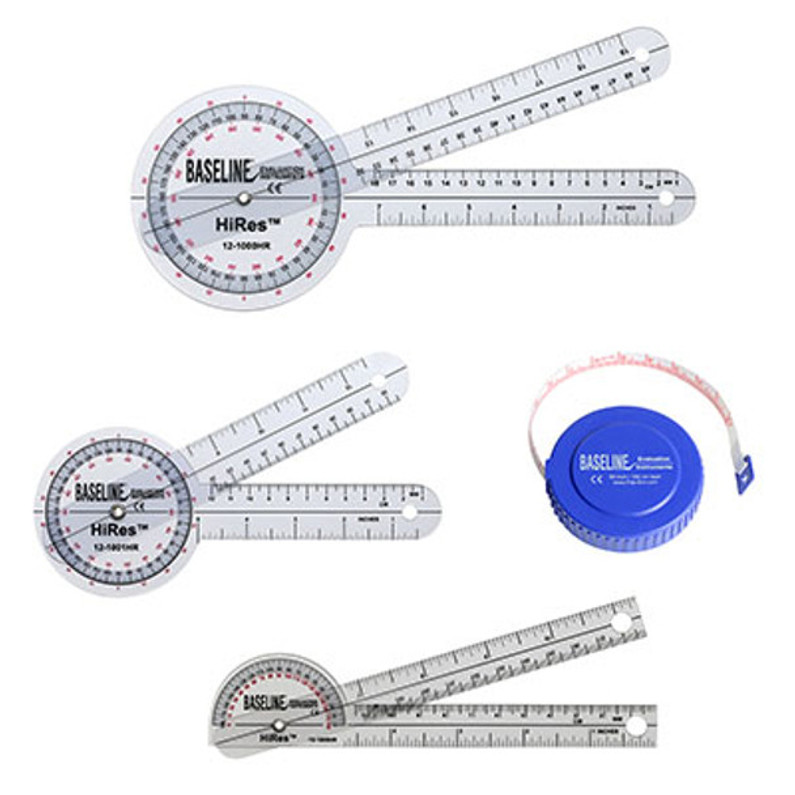Unlocking Movement: The Role of Goniometers in Physical Therapy
 Physical therapists are dedicated professionals who specialize in restoring movement, function, and quality of life for individuals with musculoskeletal conditions, injuries, or disabilities. Central to their practice is the use of various tools and techniques to assess and improve joint mobility. Among these tools, goniometers play a pivotal role in quantifying and monitoring the range of motion (ROM) at different joints in the body. In this article, we explore the multifaceted applications of goniometers in the field of physical therapy.
Physical therapists are dedicated professionals who specialize in restoring movement, function, and quality of life for individuals with musculoskeletal conditions, injuries, or disabilities. Central to their practice is the use of various tools and techniques to assess and improve joint mobility. Among these tools, goniometers play a pivotal role in quantifying and monitoring the range of motion (ROM) at different joints in the body. In this article, we explore the multifaceted applications of goniometers in the field of physical therapy.
Assessment of Joint Range of Motion
Goniometers are essential instruments used by physical therapists to measure the degrees of movement available at specific joints. By accurately quantifying joint ROM, therapists gain valuable insights into the extent of mobility, flexibility, and functional capacity. Goniometric measurements encompass various movements, including flexion, extension, abduction, adduction, and rotation, allowing therapists to assess both primary and accessory motions of the joints.
Diagnostic Evaluation
In a physical therapy practice, goniometric measurements serve as diagnostic tools to evaluate musculoskeletal conditions, identify impairments, and assess joint integrity. By comparing ROM values to established norms or reference ranges, therapists can detect abnormalities, asymmetries, or restrictions indicative of pathology, such as joint stiffness, ligamentous injuries, muscle contractures, or postural deviations.
Treatment Planning and Monitoring
Goniometers guide the development of individualized treatment plans tailored to each patient's specific needs and goals. Therapists use ROM data to set benchmarks for improving joint mobility, designing targeted stretching or strengthening exercises, and selecting appropriate therapeutic interventions. Throughout the rehabilitation process, goniometric measurements are employed to monitor progress, track changes in ROM, and adjust treatment strategies accordingly.
Postoperative Rehabilitation
Following surgical procedures such as joint replacement, ligament reconstruction, or tendon repair, goniometers are indispensable tools in postoperative rehabilitation. Physical therapists utilize goniometric measurements to assess postoperative ROM, monitor recovery progress, and guide rehabilitation interventions. Goniometers help ensure that the joint achieves sufficient mobility for functional activities while minimizing the risk of complications such as joint stiffness or contractures.
Functional Capacity Assessment
Goniometric measurements provide valuable information about a patient's functional capacity and ability to perform activities of daily living. By assessing ROM during functional tasks such as walking, reaching, or squatting, therapists evaluate movement quality, identify compensatory strategies, and tailor interventions to improve functional independence.
Goniometers enable physical therapists to unlock movement potential and optimize functional outcomes for their patients. From assessment and diagnosis to treatment planning and monitoring, goniometric measurements provide valuable quantitative data that inform clinical decision-making and guide rehabilitation interventions. As essential tools in the therapist's arsenal, goniometers exemplify the profession's commitment to restoring mobility, promoting wellness, and enhancing the quality of life for individuals across the lifespan.
Additional Blog Post:
A Guide to Joint Range of Motion (ROM) Measurement Using an Inclinometer
Recent Posts
-
How Occupational and Hand Therapists Perform Initial Hand Function Evaluations
When a patient begins hand therapy—whether recovering from an injury, surgery, or neurolo …Apr 6th 2025 -
What to Expect During Hand Therapy: A Guide for Patients and Caregivers
If you’re starting hand therapy—whether after surgery, a stroke, or a neurological …Apr 6th 2025 -
Improve Hand Function and Dexterity with the Neofect Smart Pegboard
The Neofect Smart Pegboard is a revolutionary tool in the field of occupational therapy. I …Mar 25th 2025



